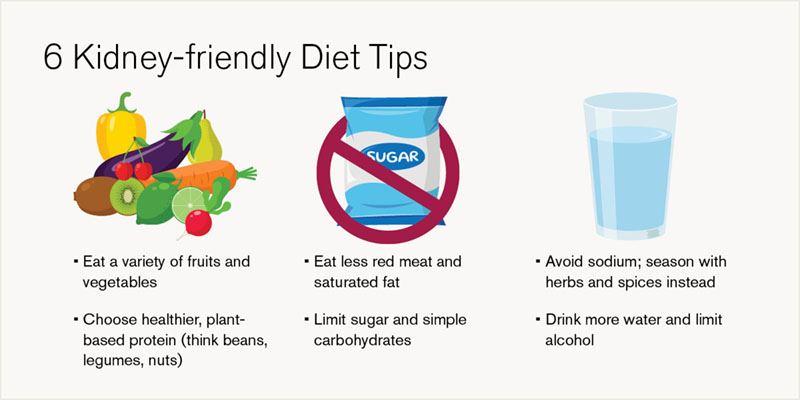Eating Healthy for Kidney Disease
April 7, 2024
Categories: Transplant, Digestive Health, Health & Wellness

Chronic kidney disease (CKD) affects one in seven U.S. adults. Untreated, CKD may lead to end-stage renal disease, dialysis and kidney transplant.
You can’t cure CKD, but you can often slow its progress, says Loyola Medicine transplant nephrologist, Divya Jain, DO. “Eating a healthy diet is essential, but knowing what to eat can be challenging,” she says. “Talking to your doctor or a dietitian can help. It’s also important to understand how the kidneys function.”
What do your kidneys do?
Every 30 minutes, healthy kidneys filter all the blood in your body. They eliminate waste and extra fluid through the urine. Some waste materials come from the breakdown of proteins in the food you eat.
Your kidneys also balance essential minerals (electrolytes). Minerals are important for bone strength, muscle contraction, energy production and other cellular functions. The main minerals in your body include:
- Calcium
- Magnesium
- Phosphorus
- Potassium
- Sodium
In kidney disease, the decline in kidney function can cause a range of health problems, such as:
- Anemia, due to reduced red blood cell production — a process your kidneys regulate
- Bone weakness from an imbalance of calcium and phosphorus
- Cardiovascular disease, including heart disease and stroke
- Hyperkalemia, a high level of potassium that can affect heart function
- Fluid retention, which can cause high blood pressure or fluid buildup in your limbs (edema) or lungs (pulmonary edema)
- Metabolic acidosis, an excess of acidic substances in your blood
- Uremia, a buildup of waste products in your blood
Managing kidney disease through your diet
One strategy for managing kidney disease through healthy eating is to control the underlying cause of CKD, says Dr. Jain. The top causes of kidney disease in the U.S. are diabetes and high blood pressure. About 30% of people with diabetes and 20% of people with high blood pressure have kidney disease.
Dietary recommendations for managing conditions commonly associated with CKD include:
- Diabetes: Control your blood sugar by limiting sugar and simple carbohydrates
- Gout: Decrease your consumption of red meat and alcohol
- Heart disease: Eat a heart healthy diet, which includes lowering sodium, saturated fat and red meat
- High blood pressure: Reduce the amount of sodium you consume
- Kidney stones: Increase water intake and limit high-protein foods, especially animal proteins

Dietary changes can also reduce the stress on your kidneys so they don’t have to work so hard. The main suggestions for improving kidney health include:
Reduce sodium
Your body needs sodium to function but most people get too much sodium in their diet. The average person in the U.S. consumes 3,400 milligrams each day, although the recommended daily amount is 2,300 milligrams. If you have CKD, your doctor may ask you to consume even less salt.
According to the Centers for Disease Control and Prevention, 70% of the sodium you eat comes from packaged and restaurant foods. Foods that contribute the most salt to your diet include:
- Bread
- Cheese
- Chips, pretzels, crackers and other savory snacks
- Cold cuts and cured meats
- Pizza
- Soups
When you’re shopping, cooking and eating out, there are many things you can do to reduce sodium. Reading food labels is an important first step. Food labels show the amount of sodium and percent daily value in each serving. Many restaurants also provide this information upon request.
“When you start tracking your sodium intake, you may be surprised how high it is,” says Dr. Jain. “A careful accounting can help you understand where the salt in your diet comes from and how to reduce it. You can even download sodium tracking apps.”
Other tips for reducing sodium include:
- Cook at home instead of eating out
- Eat more fresh or frozen fruits and vegetables
- Look for prepared meals with less than 600 milligrams of sodium per meal (the limit for labeling a meal as “healthy,” according to the Food and Drug Administration)
- Purchase packaged foods labeled “low sodium” or “no salt added”
- Request no added salt when ordering a meal at a restaurant
- Season foods with garlic, citrus, herbs and spices, instead of salt
Eat the right amount and types of protein
Eating a lot of protein can make CKD worse. Your doctor may limit the amount of protein you eat, especially if your kidney function is low. And ideally, the proteins you eat will come mainly from plants instead of animals.
A plant-based diet has many health benefits. It can help improve gut health, lower blood pressure and reduce your risk of cancer, diabetes and heart disease. When it comes to CKD, plant proteins are easier for your kidneys to break down than animal proteins. They also produce fewer waste byproducts that can cause metabolic acidosis and uremia.
“You don’t have to become a vegetarian or vegan,” says Dr. Jain. “Just try to incorporate more fruits, vegetables and plant-based proteins every day.”
Some plant-based proteins to incorporate into your diet include:
- Beans (legumes)
- Grains, such as oats and quinoa
- Nuts
- Soy products
- Tofu
Avoid phosphorus-rich foods
People with CKD often have high phosphorus levels, which can lead to a calcium imbalance and eventually, weak bones. High-phosphorus items to avoid include dark-colored soda and packaged foods. Meat and dairy products are also high in phosphorus.
Eating more plant-based foods can also help reduce phosphorus and keep your bones healthy. “People who eat plant-based diets typically have lower phosphorus levels,” says Dr. Jain.
Limit potassium
Your kidneys excrete most of the potassium you consume each day. People with CKD are at risk of developing high potassium levels, which can cause serious heart problems.
Your doctor may recommend limiting foods that contain potassium, such as bananas, cantaloupe and citrus fruits. They may also prescribe a potassium binder medication to help you eliminate potassium through your stool.
Strategies to slow the progression of chronic kidney disease
Eating healthy is just one way to manage CKD. “Taking full control of your kidney health requires a broader approach,” says Dr. Jain. To give yourself the best chance of slowing CKD:
- Control your blood pressure
- Maintain a healthy weight
- Quit smoking
- Manage your blood sugar, if you have diabetes
- Exercise regularly (at least 30 minutes per day, five days per week)
- Take your medications as prescribed
- Talk to your doctor before taking over-the-counter medications or herbal supplements
Your diet during dialysis and after kidney transplant
As kidney disease progresses, you may need dialysis or a kidney transplant. In dialysis, a machine filters your blood several times per week. During a transplant, you receive a kidney from a living or deceased donor.
If you are on dialysis, it is important to limit sodium, phosphorus and potassium. You may need to eat more protein since dialysis removes protein from your blood. If you receive a transplant, you will have a very different diet that typically includes increased protein, phosphorus and magnesium.
During dialysis and transplant, a dietitian helps you manage your diet. They help ensure you’re eating the right foods to protect your kidneys and getting the nutrition you need to be healthy.
For patients with CKD, Dr. Jain recommends learning more about transplant well before you become eligible. “You should always know your numbers and the criteria for receiving transplant,” she says. “If living donation is an option, preparing ahead can help streamline the transplant process, if that time comes.”
Kidney transplantation at Loyola Medicine
When choosing a transplant center, look to Loyola for exceptional expertise and personalized care before, during and after transplant. Our kidney transplant team provides comprehensive support for you and your caregiver, plus access to clinical trials. We also offer transplant for qualifying patients using state-of-the-art robotic surgery.
To find out more about Loyola Medicine’s Transplant Center, call 708-327-3700.
Divya Jain, DO, is a transplant nephrologist and medical director for living donation at Loyola Medicine. Dr. Jain received her medical degree from the Chicago College of Osteopathic Medicine. She completed fellowships at the University of Illinois and University of Chicago Medical Center.
Book an appointment today to see Dr. Jain or another Loyola transplant specialist by calling 708-327-3700. You can also self-schedule an in-person or virtual appointment online with thousands of other Loyola Medicine providers with myLoyola.
